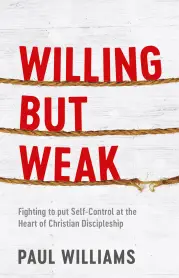The book of Titus reveals that self-control is an essential component to living a faithful Christian life. Motivated by the cross, the return of Christ and equipped by the Holy Spirit, self-control will both rescue us from ship-wrecking our lives and help us live more effectively for Christ's glory. From how we use our time, through to the use of our tongue, in drink, sex, money and exercise, Willing But Weak shows that putting self-control at the heart of discipleship is hugely beneficial for us.
What others are saying about Willing but Weak:
'Piercing and practical ... I can't think of a timelier book in the last 30 years.'
— Rico Tice, Senior Minister, All Souls Langham Place
'Full of practical advice ... convicting, counter-cultural and immensely helpful.'
— Rhodri Brady, Pastor, Alfred Place Baptist Church
'Warm and wise. Like listening to a father share biblical advice with his family.'
— Matt Fuller, Senior Minister, Christ Church Mayfair
-
Title
Willing But Weak
-
Author(s)
-
ISBN
9781913278007
-
Format
Paperback
-
Publisher
-
Topic
Self Control
-
Audience
Adults
-
Pages
112
-
Published
01/03/2020



